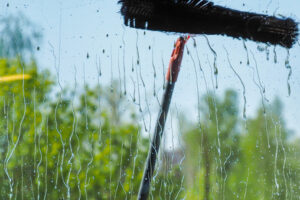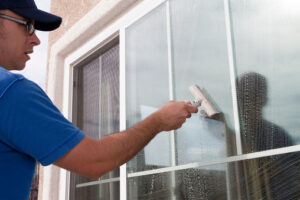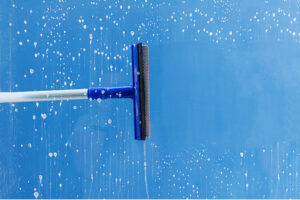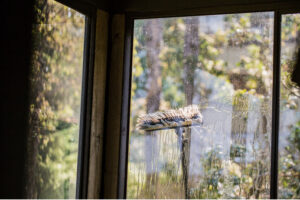Are you looking for a way to get your windows sparkling clean without using harsh chemicals? Look no further! Making pure water for window cleaning is easy, cost-effective and eco-friendly. Pure water is free of particles, calcium deposits and other contaminants that can leave water spots on your windows. In this article, we’ll take a look at how to make pure water for window cleaning at home.
Pure water can be made with just a few simple ingredients and tools, including a distiller or reverse osmosis system. With either of these systems, you can make pure water in just minutes. We’ll also discuss the benefits of using pure water for window cleaning and provide some tips for making the process easier. So let’s get started!
Making pure water for window cleaning is an easy way to keep your windows looking their best without having to use harsh chemicals or expensive store-bought cleaners. With just a few simple steps, you can have sparkling clean windows in no time – without damaging the environment or breaking the bank! Read on to learn how to make pure water at home so you can enjoy spotless windows every day.
What Is Pure Water Window Cleaning?
 Window cleaning is the process of removing dirt, dust and grime from the glass surfaces of windows. It’s a common task for window cleaners, but it can be difficult to do properly. That’s where pure water window cleaning comes in.
Window cleaning is the process of removing dirt, dust and grime from the glass surfaces of windows. It’s a common task for window cleaners, but it can be difficult to do properly. That’s where pure water window cleaning comes in.
Pure water window cleaning is an effective method that involves using reverse osmosis systems to create deionized or demineralized water with a very low TDS (total dissolved solids) meter reading. This ultra-pure water has no mineral content and can be used to clean windows without leaving streaks or residue behind. The process starts by filtering tap water in a reverse osmosis system, which removes all of the minerals and other impurities from the water. This leaves only pure H2O, which is then pumped up through a high-pressure hose to a brush attached to an extension pole. When applied to windows, the ultra-pure water creates a strong bond between itself and any dirt particles on the glass surface, allowing them to be easily wiped away with minimal effort.
Pure water window cleaning is quickly becoming more popular among professional window cleaners due to its efficacy and efficiency. With this method, there’s no longer any need for expensive chemical cleaners or squeegees – just pure water and some elbow grease!
Benefits Of Using Pure Water
Using pure water for window cleaning has many benefits. The most obvious advantage is that it completely eliminates the need for chemical cleaners and squeegees. This makes the process much easier and more efficient, as well as being better for the environment.
Another benefit of using pure water window cleaning is that it can achieve amazing results with minimal effort. The ultra-pure water is able to create a strong bond between itself and any dirt particles on the glass surface, allowing them to be easily wiped away with just a brush and some water pressure. This means that windows can be cleaned quickly and thoroughly without any streaks or residue left behind.
Finally, pure water window cleaning also ensures a higher overall quality of cleanliness than traditional methods. By running tap water through a reverse osmosis system and then removing all minerals with a di resin filter, it’s possible to achieve an extremely low TDS (total dissolved solids) reading – typically less than 10ppm! This ultra-pure water will leave your windows looking crystal clear every time.
Sources Of Pure Water
Finding a source of pure water for window cleaning is the first step in taking advantage of this beneficial method. Fortunately, there are several options available that can provide a suitable water supply.
The top choice for sourcing pure water is a reverse osmosis (RO) system. This system uses multiple stages of filtration to remove impurities from the tap water, resulting in an ultra-pure liquid that’s perfect for window cleaning. Additionally, RO systems are relatively inexpensive and easy to use, making them ideal for both commercial and residential applications.
Alternatively, if you don’t have access to an RO system, it’s still possible to get good results with just a garden hose. Simply connect the hose to a clean source of fresh water – such as a natural spring or pond – and then run the water through some basic filters before using it for window cleaning. This will help ensure that any dirt or debris is removed and won’t cause streaking when wiping down the windows.
No matter which source you choose, pure water window cleaning can help make your job easier while achieving great results in less time!
Steps For Making Pure Water At Home
Making pure water for window cleaning at home is not as difficult as it may seem. With the right supplies and some basic knowledge, anyone can make a solution that’s suitable for window cleaning with ease.
First, you will need to gather all of the supplies necessary for the task. This includes a container to hold the water, some clean filters such as a coffee filter or cheesecloth, and an optional RO system for extra filtration. Once these items are in place, you can begin making your pure water solution.
To start, fill the container with tap water and then pass it through the filters to remove any dirt or debris. If you have an RO system available, you can use this to further refine the solution before using it on your windows. Finally, if desired, add a window cleaner of your choice to the water and stir until it’s fully dissolved. Your homemade pure water window cleaner is now ready to use!
Using this method, you can quickly and easily create a safe and effective solution that’s perfect for window cleaning – no matter where you are!
Equipment Needed For Making Pure Water
 Now that you know the steps for making pure water at home, it’s time to discuss the equipment needed. While this process is relatively straightforward, having the right supplies will make it easier and more efficient.
Now that you know the steps for making pure water at home, it’s time to discuss the equipment needed. While this process is relatively straightforward, having the right supplies will make it easier and more efficient.
To begin with, you’ll need a large container that can hold the tap water you’ll be using. Additionally, you’ll want some type of filtration device to remove any particles or debris. Coffee filters and cheesecloth are great options for this, though an RO system can also be used for extra refinement. Finally, if desired, a window cleaner of your choice can be added to the mixture before cleaning windows.
By gathering all of these items beforehand, you’ll be able to make pure water with ease and ensure that your windows are spotless every time!
Different Types Of Filters For Producing High-Quality Water
When creating pure water for window cleaning, one of the most important steps is to use a filter. Filters come in a variety of types and sizes and can help remove particles and debris from your tap water. Whether you’re using coffee filters or an RO system, it’s essential to choose the right filter for the job.
Coffee filters are one of the most popular options for creating pure water at home. Not only are they inexpensive and easy to find, but they also do a good job of removing small particles from your tap water. They may not be as effective as other filtration methods, however, so if your windows need extra-clean results, you may want to consider an RO system instead.
RO systems are more expensive than coffee filters, but they provide superior filtration and can help produce high-quality water for window cleaning. These systems tend to be more complicated as well, so if you’re not comfortable with installing them yourself, it’s best to hire a professional. No matter which option you choose, make sure it meets your needs and provides the cleanest possible results each time!
How To Test The Quality Of Your Home-Made Pure Water
Once you’ve chosen the right filter for your needs, it’s important to test the quality of the water you’re producing. This can help ensure that you’re getting the desired results each time and that no harmful particles are present in the water. Fortunately, there are a few simple ways to check the purity of your home-made pure water.
The first way to test your water is with a pH test strip. These strips will tell you whether or not your water is acidic or alkaline and can give you an indication of its overall quality. You can also use a TDS meter to measure how much total dissolved solids are present in your water. The lower the number, the better!
Finally, consider running a clear glass full of your filtered water through a light source and examining it closely. If any particles or sediment appear in the glass, that means they would also be present on your windows during cleaning and could lead to smudges or streaks. It’s best to start over if this happens and run another round of filtration before using your pure water for window cleaning.
Advantages Of Using Distilled Vs Purified Water
When it comes to window cleaning, both distilled and purified water can be effective. However, there are a few key advantages to using distilled water instead of purified. For one, distilled water is 100 percent pure and free of any contaminants or minerals that could lead to streaks or smudges on your windows. It also has a neutral pH balance and won’t leave behind any residue when evaporating.
Another benefit of using distilled water is that it’s more cost-effective than having to buy purified water every time you need to clean your windows. All you need is an inexpensive distiller unit, which can produce up to eight gallons of pure water per day at minimal cost. This means you’ll save money in the long run compared to frequently buying bottles of purified water.
Distilled water also doesn’t require any additional filtration before use, saving you time as well as money. As long as you remember to keep your distiller unit clean and free from contaminants, you can rest assured that your window cleaning will be streak-free every time!
Techniques For Window Cleaning With Pure Water
Once you have an ample supply of pure water, it’s time to learn some techniques for window cleaning. The most important thing to remember is to use gentle strokes and avoid scrubbing, as this can damage the glass. Start by wiping down the surface with a lint-free cloth or damp sponge in circular motions. This will help remove any dirt, dust, or debris that may have accumulated on the window.
For tougher spots and stains, you can try using a mixture of warm water and dish soap. Dip your cloth into the mixture and gently rub in a circular motion until the stain is gone. If necessary, you can also use a soft bristled brush to help break up tougher dirt and grime but be sure to rinse off any soap residue afterwards with clean water.
Finally, after all the dirt has been removed from the window surface, use a squeegee or microfiber cloth to dry off any remaining moisture. This will help ensure that no streaks are left behind and your windows will look crystal clear!
Tips And Tricks To Ensure Streak-Free Windows
Now that you know the basics of window cleaning with pure water, here are some tips and tricks to help ensure streak-free windows. First, choose a cloudy day for your window cleaning. Direct sunlight can cause streaks and smudges to appear on the glass more quickly. Second, use lint-free cloths or newspaper to dry off the windows after washing them. Regular towels or rags tend to leave behind fibers which can create streaks. Third, always start at the top of the window and work your way down. This will help prevent dirt from running back onto clean surfaces as you work. Finally, consider investing in a quality squeegee for those hard-to-reach areas around frames and corners. This will help get into all those nooks and crannies and make sure every inch of your window is spotless!
Other Uses For Home-Made Pure Water
 Pure water is not just great for window cleaning. It can be used in a variety of ways around the home, such as for mopping floors, washing dishes and even laundry. The lack of chemicals makes it a safer choice for those with allergies or sensitivities to harsh detergents.
Pure water is not just great for window cleaning. It can be used in a variety of ways around the home, such as for mopping floors, washing dishes and even laundry. The lack of chemicals makes it a safer choice for those with allergies or sensitivities to harsh detergents.
It’s also a great choice for outdoor cleaning needs, such as removing dirt from outdoor furniture and pathways. Not to mention that it’s more environmentally friendly than many other cleaning solutions. And because it doesn’t contain any harsh chemicals, it won’t damage delicate surfaces like car paint or garden plants.
Pure water can even be used to give your car a good wash – just make sure you dry the car thoroughly afterwards. For bigger jobs, consider investing in a pressure washer so you can reach higher up windows or remove stubborn stains from concrete driveways or patios with ease. By using pure water at home you’ll not only be saving money but also doing your bit to help protect the environment!
Safety Considerations When Working With Pure Water
It’s important to take certain safety precautions when working with pure water. First, always make sure you wear gloves and other protective gear when cleaning with pure water. You should also avoid using it on surfaces that are easily damaged by water, such as wood or marble. And if you’re using a pressure washer, be sure to read all instructions before beginning the job, as they can be very powerful and could cause damage if not used correctly.
Always keep in mind that pure water doesn’t contain any detergent or soap, so it won’t help to remove grease or oil from surfaces. For this type of job you’ll need to find an appropriate cleaner – but don’t worry, there are plenty of natural alternatives available which are just as effective and better for the environment.
Finally, remember that pure water is not suitable for drinking purposes due to its lack of minerals – so if you’re thinking about making some yourself at home, it’s best to use it for cleaning only!
Cost-Benefit Analysis Of Purchasing Vs Making Your Own Purified Water
When it comes to cleaning with pure water, you might be wondering whether it’s better to purchase or make your own. There are several factors to consider when making this decision, including cost, convenience and environmental impact.
When it comes to cost, it can be significantly cheaper to make your own purified water at home. All you need is a filter system and a few supplies, which can be relatively inexpensive if you shop around. However, the cost of purchasing pre-made pure water can quickly add up over time, so making your own may still be the more economical choice in the long run.
On the other hand, buying pre-made pure water can save you time and effort – as well as being more convenient for those who don’t have access to filtration systems or just don’t want to go through the hassle of setting one up. Additionally, using store-bought pure water also has a lower carbon footprint than making your own – so if you’re looking for a more eco-friendly way of cleaning with pure water then purchasing may be the better option.
Ultimately, what works best will depend on your individual needs and preferences – but whatever you choose remember that safety should always come first!
Solutions To Common Problems When Working With Purified Water
No matter which method you choose for cleaning with pure water, it’s important to be aware of the common issues that may arise. From clogged filters to limescale build-up, here are some solutions to help you get the most out of your purified water.
One of the most common problems is clogging, which can occur when using a filter system to make your own pure water. This can be caused by sediment or other particles getting stuck in the filter, so it’s important to check and clean the filter regularly. If necessary, you can also purchase a higher quality filter that will be able to trap more particles.
Another issue that may arise is limescale build-up on windows and other surfaces after cleaning with pure water. To prevent this from happening, make sure you thoroughly rinse off all surfaces after cleaning and don’t let them remain wet for too long. You can also use vinegar or a dedicated limescale remover for tougher stains and build-up.
Finally, if you’re using store-bought pure water it’s important to check the expiry date before use as out-of-date products can contain bacteria or impurities which could cause damage to your surfaces or harm your health if ingested. So always make sure your pure water is fresh before use!
Long-Term Maintenance And Storage Of Your Home-Made Purified Window Cleaning Solution
Once you have your purified window cleaning solution sorted, there are a few things to consider when it comes to maintenance and storage. With the right care, your pure water can last for months before needing to be replaced.
First of all, it’s important to store your purified water correctly in order to maintain its quality. This means keeping it away from direct sunlight and heat sources, as these can cause the water to become contaminated with bacteria or other impurities. It’s also a good idea to store it in an airtight container so that no dust or dirt can enter the water.
Secondly, if you’re using a filter system, regular maintenance is key for making sure it continues to work properly. This means cleaning out any sediment or other particles that may have built up in the filter every few weeks or so. And if you’re using distilled water, make sure you replace the filter regularly according to manufacturer’s instructions.
Finally, it’s important to keep checking the pH balance of your purified water every few months or so in order to make sure it’s still effective for cleaning windows and other surfaces. If necessary, add some pH-balancing chemicals such as baking soda or vinegar in order to restore optimal pH levels and make sure your pure water is still suitable for use.
Conclusion
 Pure water window cleaning has become an increasingly popular option for many homes and businesses due to its many benefits. Making your own pure water can be a great way to save money and have access to a reliable source of pure water for window cleaning. With the right equipment and knowledge, making your own pure water is an easy process that can be done from the comfort of your home. It is important to keep safety in mind when working with purified water, as well as understanding the cost-benefit analysis of purchasing vs making your own solution. With proper maintenance and storage of your home-made purified window cleaning solution, you’ll have a reliable source of clean windows for years to come.
Pure water window cleaning has become an increasingly popular option for many homes and businesses due to its many benefits. Making your own pure water can be a great way to save money and have access to a reliable source of pure water for window cleaning. With the right equipment and knowledge, making your own pure water is an easy process that can be done from the comfort of your home. It is important to keep safety in mind when working with purified water, as well as understanding the cost-benefit analysis of purchasing vs making your own solution. With proper maintenance and storage of your home-made purified window cleaning solution, you’ll have a reliable source of clean windows for years to come.
Overall, using pure water for window cleaning is an excellent choice for anyone looking for a safe, affordable, and efficient way to keep their windows sparkling clean. The process may seem intimidating at first, but with the right steps and equipment it can be easily done from the comfort of your home. When considering how to make pure water for window cleaning, it’s important to consider all factors such as safety considerations, cost-benefit analysis and long-term maintenance and storage before beginning the process. By taking these measures into account you can rest assured that you are creating a safe and efficient pure water solution that will provide long lasting results.

Recent Comments